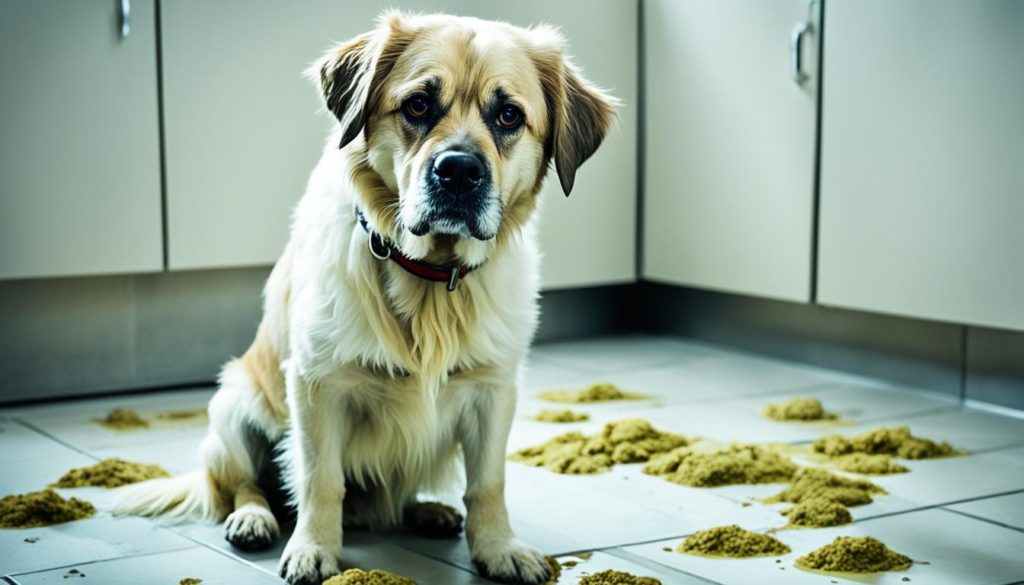Is your dog throwing up and having diarrhea? These symptoms can be concerning, but they are relatively common in dogs and can be caused by a variety of factors. Understanding the causes and appropriate treatments is essential for your pet’s health and well-being.
When your dog experiences vomiting and diarrhea, it’s important to assess the severity of the symptoms and determine if immediate veterinary attention is necessary. Certain signs, such as multiple occurrences of vomiting or diarrhea, persistent symptoms, loss of energy, and the presence of blood in vomit or stool, require immediate professional care. However, not all cases are emergencies, and some can be managed at home with proper care and monitoring.
Common causes of vomiting and diarrhea in dogs include dietary indiscretion, food allergies or sensitivities, stress, parasites, mild infections, toxins, metabolic illnesses, hormonal disorders, foreign objects, and gastrointestinal ulcers. These factors can irritate the stomach and intestines, leading to gastrointestinal distress in your furry friend.
When you visit the veterinarian, they will assess the seriousness of your dog’s symptoms through a physical examination and diagnostic tests. They may conduct a fecal analysis, bloodwork and urine analysis, radiographs, or tests for infectious diseases to rule out underlying causes and determine the appropriate treatment.
The treatment for vomiting and diarrhea depends on the underlying cause and the severity of the symptoms. In mild cases, a short period of fasting followed by a bland diet can help settle the stomach. Ensuring proper hydration is also crucial, especially if your dog is dehydrated. Medications for nausea and addressing the underlying cause, such as infections or food allergies, may be necessary in more severe cases.
Remember, if your dog is experiencing severe or persistent symptoms, it’s always best to consult a veterinarian. They can provide the necessary guidance and treatment to ensure your pet’s well-being. By following preventive measures, such as proper diet, avoiding exposure to harmful substances, and regular veterinary check-ups, you can help reduce the occurrence of vomiting and diarrhea in your dog.
Key Takeaways:
- Multiple occurrences of vomiting or diarrhea, persistence of symptoms, and the presence of blood in vomit or stool require immediate veterinary attention.
- Common causes of vomiting and diarrhea in dogs include dietary indiscretion, food allergies or sensitivities, stress, parasites, mild infections, toxins, metabolic illnesses, hormonal disorders, foreign objects, and gastrointestinal ulcers.
- Veterinarians assess vomiting and diarrhea through physical examination and diagnostic tests such as fecal analysis, bloodwork and urine analysis, radiographs, and tests for infectious diseases.
- The treatment for vomiting and diarrhea depends on the underlying cause, and it may include temporary fasting, a bland diet, fluid therapy, medications for nausea, and addressing underlying issues.
- Consult a veterinarian for severe or persistent symptoms, and follow preventive measures such as proper diet, avoiding harmful substances, and regular check-ups to prevent vomiting and diarrhea in dogs.
Common Causes of Vomiting and Diarrhea in Dogs
There are various reasons why a dog may experience vomiting and diarrhea. Common causes include:
- Eating something they shouldn’t: Dogs have a tendency to eat things they shouldn’t, such as table scraps or garbage.
- Food allergies and sensitivities: Just like humans, dogs can have allergies or sensitivities to certain foods.
- Stress: Stress can be a common cause of diarrhea, especially during boarding or other unfamiliar situations.
- Parasites: Worms and other parasites can irritate the gastrointestinal tract and lead to vomiting and diarrhea.
- Mild infections: Infections, such as gastrointestinal viruses, can cause digestive upset in dogs.
- Toxins: Consuming toxic substances, like chocolate or certain plants, can result in vomiting and diarrhea.
- Metabolic illnesses: Conditions affecting the liver, kidneys, pancreas, or gall bladder can contribute to digestive issues.
- Hormonal disorders: Imbalances in hormones, such as those caused by thyroid or adrenal gland problems, can affect gastrointestinal function.
- Foreign objects: Ingesting objects that are difficult to pass, like bones or toys, can lead to blockages and digestive issues.
- GI ulcers: Ulcers in the gastrointestinal tract can cause vomiting and diarrhea in dogs.
These factors can contribute to an upset stomach and gastrointestinal distress in dogs.
How Veterinarians Assess Seriousness of Vomiting and Diarrhea
When your dog is experiencing vomiting and diarrhea, it is crucial for veterinarians to assess the seriousness of the condition. This is done through a combination of physical examination and diagnostic tests to determine the underlying cause and appropriate treatment.
During the physical exam, veterinarians will carefully examine your dog for signs of dehydration, fever, and abdominal pain. These are important indicators of the severity of the condition.
In addition to the physical exam, the veterinary staff may ask you questions about your dog’s history, diet, recent exposure to toxins or infectious agents, and any previous episodes of vomiting and diarrhea. This information helps in narrowing down the possible causes and guiding the diagnostic process.
Diagnostic tests play a crucial role in identifying the underlying cause of your dog’s vomiting and diarrhea. These tests may include:
- Fecal analysis: This test involves examining your dog’s stool for the presence of parasites, bacteria, or other abnormalities.
- Bloodwork and urine analysis: These tests provide valuable insights into your dog’s overall health, including the function of key organs and the presence of any infections or imbalances.
- Radiographs: X-rays can help identify any obstructions, foreign objects, or abnormalities in the gastrointestinal tract.
- Tests for infectious diseases: Depending on the symptoms and suspected causes, veterinarians may recommend specific tests to rule out or confirm the presence of infectious diseases.
By conducting these assessments and diagnostic tests, veterinarians can gather important information to make an accurate diagnosis and develop an effective treatment plan for your dog’s vomiting and diarrhea.

| Assessment Methods | Diagnostic Tests |
|---|---|
| Physical examination | None |
| History and questioning | None |
| Fecal analysis | Checks for parasites, bacteria, and abnormalities |
| Bloodwork and urine analysis | Assesses overall health and checks for infections or imbalances |
| Radiographs | Identifies obstructions, foreign objects, or abnormalities in the gastrointestinal tract |
| Tests for infectious diseases | Rules out or confirms the presence of infectious diseases |
Treatment for Vomiting and Diarrhea in Dogs
The treatment for vomiting and diarrhea in dogs depends on the underlying cause and severity of the symptoms. In mild cases, a short period of fasting followed by a bland diet can help settle the stomach and ease digestive distress. It is important to consult with your veterinarian to determine the best course of action for your furry friend.
If your dog is experiencing vomiting and diarrhea, you can try the following treatment options:
- Short period of fasting: Giving your dog’s digestive system a break by withholding food for 12-24 hours can help alleviate symptoms. This allows the stomach and intestines to rest and recover.
- Bland diet: After the fasting period, gradually reintroduce a bland diet, such as boiled chicken and plain white rice, to soothe your dog’s stomach. This easy-to-digest diet can help firm up the stool and provide the necessary nutrients without further irritating the digestive system.
- Fluids for hydration: It is important to keep your dog well-hydrated, especially if they are experiencing vomiting and diarrhea. Offer small amounts of water frequently or consider using electrolyte solutions designed for dogs to replenish lost fluids and essential minerals.
- Medications for nausea: In some cases, your veterinarian may prescribe medications to help alleviate nausea and vomiting in your dog. These medications can help reduce discomfort and prevent further episodes of vomiting.
- Treatments for underlying causes: If the vomiting and diarrhea are caused by underlying issues such as infections or food allergies, specific treatments may be necessary. Your veterinarian may recommend antibiotics, antiparasitic medications, or dietary changes to address the underlying cause and promote healing.
Remember, it is essential to consult with your veterinarian before starting any treatment for your dog’s vomiting and diarrhea. They will be able to provide a proper diagnosis and develop a tailored treatment plan based on your dog’s individual needs. Providing the right care and treatment can help your furry companion recover faster and ensure their overall well-being.
Frequently Asked Questions
Q: Can I feed my dog their regular food during the bland diet phase?
A: It is best to avoid feeding your dog their regular food during the bland diet phase. Stick to easily digestible foods like boiled chicken and plain white rice. Once your dog’s symptoms have subsided, you can gradually transition them back to their regular diet.
Q: How long should I wait before seeking veterinary treatment for my dog’s vomiting and diarrhea?
A: If your dog’s symptoms persist for more than 24 hours, or if they are experiencing severe vomiting, diarrhea with blood, dehydration, loss of appetite, or other concerning symptoms, it is important to seek veterinary care immediately. These may be signs of a more serious underlying condition that requires medical attention.

Conclusion
Vomiting and diarrhea are common symptoms that dogs may experience due to various factors. While some cases can be managed at home with proper care and monitoring, it is important to consult a vet for severe or persistent symptoms.
When your dog is experiencing mild vomiting and diarrhea, there are some home remedies you can try. Providing a bland diet, such as plain chicken and rice, can help settle their stomach. It is also crucial to ensure your dog stays hydrated by offering them fluids.
Prevention plays a significant role in reducing the occurrence of vomiting and diarrhea in dogs. By maintaining a proper diet, avoiding exposure to harmful substances, and scheduling regular veterinary check-ups, you can safeguard their overall well-being and minimize the risk of these symptoms.
Remember, if your dog’s symptoms worsen, persist, or if you notice any alarming signs, it is always best to seek the advice of a veterinarian. They have the expertise to assess the seriousness of the condition and provide appropriate treatment and care for your furry friend.
FAQ
Why is my dog throwing up and having diarrhea?
There are various reasons why a dog may experience vomiting and diarrhea, including dietary indiscretion, food allergies or sensitivities, stress, parasites, mild infections, toxins, metabolic illnesses, hormonal disorders, foreign objects, and GI ulcers.
What are the causes of dog vomiting and diarrhea?
The common causes of dog vomiting and diarrhea include eating something they shouldn’t, food allergies and sensitivities, stress, parasites, mild infections, toxins, metabolic illnesses, hormonal disorders, foreign objects, and GI ulcers.
What are the treatments for dog vomiting and diarrhea?
The treatment for dog vomiting and diarrhea depends on the underlying cause and severity of the symptoms. In mild cases, a short period of fasting followed by a bland diet can help settle the stomach. Fluids may be required for hydration, and medications can be prescribed to alleviate nausea and firm up the stool. In cases with specific underlying causes, such as infections or food allergies, antibiotics or dietary changes may be recommended.
What should I do when my dog has vomiting and diarrhea?
If your dog is experiencing vomiting and diarrhea, it is best to consult a veterinarian. While some cases can be managed at home with proper care and monitoring, severe or persistent symptoms require professional attention. Your vet will be able to assess the seriousness of the condition and recommend the appropriate treatment.
What are the home remedies for dog vomiting and diarrhea?
For mild cases of dog vomiting and diarrhea, you can try providing a short period of fasting followed by a bland diet, such as plain chicken and rice. It is also important to ensure your dog stays hydrated. However, it is always best to consult with a veterinarian to rule out any underlying causes and receive proper guidance.
When should I see a vet for dog vomiting and diarrhea?
You should see a vet for dog vomiting and diarrhea if your dog experiences multiple occurrences of vomiting or diarrhea, vomiting for more than 12 hours, diarrhea lasting for more than 24 hours, noticeable loss of energy, loss of appetite for more than one meal, presence of blood in vomit or stool, visible parasites or worms, signs of pain, or dehydration.
How do veterinarians assess the seriousness of vomiting and diarrhea in dogs?
Veterinarians assess the seriousness of vomiting and diarrhea through a combination of physical examination and diagnostic tests. The physical exam helps identify any signs of dehydration, fever, or abdominal pain. Diagnostic tests, such as fecal analysis, bloodwork, urine analysis, radiographs, and tests for infectious diseases, may be recommended to determine the underlying cause and appropriate treatment.
What can I do to prevent dog vomiting and diarrhea?
To prevent dog vomiting and diarrhea, it is important to maintain a proper diet for your dog, avoiding feeding them anything they shouldn’t have. Avoiding exposure to harmful substances and ensuring your dog’s environment is safe can also help prevent these issues. Regular veterinary check-ups can help identify any potential concerns before they develop into more serious problems.
